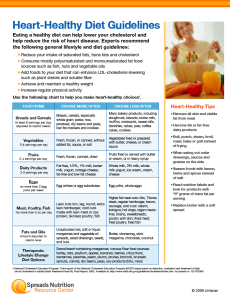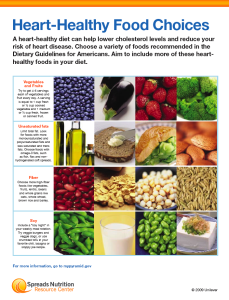Heart disease is the number one killer in America. With some planning and commitment, you can drastically reduce your risk of becoming a heart disease victim. Exercise and nutrition can play a vital role in preventing heart problems and can even reduce the risk of recurring heart attacks.
The following nutrition practices can help you keep your heart pumping to its full capacity:
Maintain a healthy body weight
If you are overweight, cut back on your portions and calories to begin slowly losing weight. A weight loss of 1-2 pounds a week is considered reasonable and safe. Even a 10% reduction in weight can improve cholesterol levels and reduce risk of heart disease.
Load up on fruits and vegetables
Fruits and vegetables are generally low in calories and loaded with antioxidants, fiber, vitamins and minerals that can protect the heart from damage. Be sure to get the most out of your fruits and vegetables by eating a variety of colors.

Choose high fiber
Aim for 25 to 30 grams of total fiber daily. Soluble fiber forms a gel that binds cholesterol in the small intestine and takes it out of the body. Soluble fiber is found in whole grain foods such as oatmeal, apples, oranges, beans, legumes and nuts. The other form of dietary fiber, insoluble, aids in weight loss by slowing digestion and enhancing satiety. Insoluble fiber can be found in whole wheat products, rice, barley, cabbage, cauliflower and skins of fruits and vegetables.
Eat oily fish twice a week
Fish is a good source of protein and other nutrients. It also contains omega-3 fatty acids, which may help reduce the risk of heart disease and stroke. The American Heart Association recommends at least 2 or more servings (4 ounces per serving) of oily fish per week such as salmon, trout, sardine, herring, and mackerel.
Cut back on saturated fat, trans fat and dietary cholesterol
If eaten in excessive amounts, saturated fat and trans fat can raise cholesterol levels. Saturated fat is found in animal products including whole milk, 2% milk, regular cheese, butter, sour cream, dressings, and meats. No more than 10% of total calories should come from saturated fat. In order to reduce dietary fat, use liquid vegetable oils, low fat dairy products, remove visible fat from meat and poultry, limit use of processed meats and consume fewer processed foods.
Experiment with soy protein
When used in conjunction with a low saturated fat and cholesterol diet, 25 grams of soy protein a day may reduce the risk of heart disease. Try soy milk as a beverage or on cereal, use tofu in dips, spreads and lasagna, add soybeans or tofu to stir fry or try soy nuts or soy burgers.

Look for plant sterols
Plant sterols are cholesterol-reducing food components that come from vegetables, nuts and seeds. Plant sterols lower cholesterol levels by competing with dietary cholesterol for absorption. Research has shown that .4 grams of plant sterols eaten twice a day can decrease cholesterol by 6%. To get adequate sterols that occur naturally in foods it would take 12 cups of broccoli, 70 large carrots, or 26 oranges. It is best to purchase specialty products with added sterols such as yogurts, orange juice, margarine, and some cereals.
Say yes to nuts
Consuming 1 oz of unsalted nuts daily can assist in decreasing cholesterol levels. Walnuts specifically have a significant amount of omega-3 fatty acids and antioxidants that can reduce inflammation. Be sure to decrease calories from another meal or snack before adding in nuts because they contain a lot of calories and can lead to weight gain.
Cut back on salt
The United States Department of Agriculture released new sodium guidelines this year which state that no one should consume more than 2,300 mg of salt per day. Anyone over the age of 51, African Americans, or anyone with high blood pressure, diabetes or chronic kidney disease should further limit their salt intake to no more than 1500 mg a day.
Please be sure to check out some wonderful, heart-healthy recipe tips and substitutions here!
